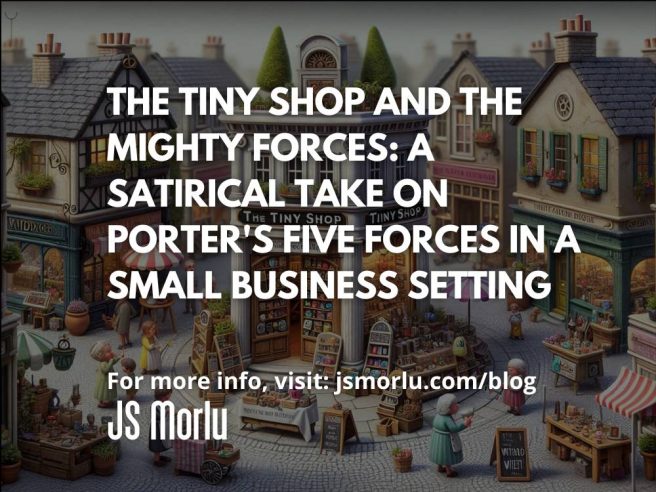By: John S. Morlu II, CPA
Introduction: Enter the Arena of Commerce
Welcome to the world of small business, a realm where ambitions soar, savings are poured into dreams, and reality checks come as frequently as the morning coffee. Here, the marketplace isn’t merely a place of transactions but a grand colosseum where entrepreneurs don their armor, ready to face the fierce competition that awaits. Imagine this bustling arena, where each venture, no matter how modest, is engaged in a battle of wits and survival. It is in this very setting, amidst the clang of commerce and the relentless pursuit of success, that we encounter the Tiny Shop—an unassuming haven specializing in artisanal widgets. At first glance, it might seem like a quaint little enterprise that doesn’t warrant a second thought from the giants of strategic business theory.
But hold your skepticism, for even this humble establishment is not immune to the formidable forces that shape the business world. Michael Porter’s Five Forces, often associated with multinational behemoths and corporate juggernauts, are just as relevant to the daily struggles of our modest widget vendor. The Tiny Shop, with its charming façade and unique offerings, is about to discover that its existence is intertwined with the same competitive dynamics and strategic pressures faced by the industry’s titans.
So, prepare yourself for a journey into the heart of small business strategy where the lofty principles of Porter’s Five Forces collide with the delightful absurdities and unexpected challenges of a quaint local shop. As we delve into this narrative, you’ll see how even the smallest players must navigate the turbulent waters of competition, supplier power, buyer influence, and the ever-looming threat of substitutes. In this lively exploration, the Tiny Shop will illuminate how grand theories apply to everyday commerce, making this a tale of strategic survival that is both insightful and richly entertaining.

Chapter 1: The “Competition” Force: A Village of Widgeteers
First up in Porter’s arsenal is the force of competition. In the grand world of business strategy, competition is often depicted as a fierce, relentless battle between corporate titans. However, in the small business realm, it’s more like a quirky rivalry in a small village where everyone knows everyone’s grandmother.
Our protagonist, the Tiny Shop, is surrounded by a smattering of other widget-selling establishments, each with their unique spin on the product. Down the street, there’s “Old Man Jenkins’ Curio Shop,” famous for its antique widgets that probably survived the Industrial Revolution. Across the road is “Betty’s Boutique,” where the widgets come with a free cup of herbal tea. And let’s not forget “Techno Tim’s Emporium,” offering high-tech widgets that come with apps nobody really needs but everyone buys because, well, they’re shiny and futuristic.
In a world where competition means jockeying for market share, the Tiny Shop’s owner, Mr. Widgetson, often finds himself scratching his head. “How do I compete with Old Man Jenkins’ legacy widgets? Or Betty’s holistic widget experience? And don’t get me started on Techno Tim’s flashing gizmos!” he mutters. But what Mr. Widgetson doesn’t realize is that this competition is less about who has the best widgets and more about who can out-charm the villagers. After all, in this quaint little market, brand loyalty isn’t just about quality—it’s about who throws the best neighborhood barbecue.
Chapter 2: The “Threat of New Entrants”: The Terrifying Prospect of Little Timmy’s Lemonade Stand
Next, we encounter the force that is the threat of new entrants. In the corporate world, this is depicted as the constant fear that some new startup, with its disruptive technology and venture capital backing, will swoop in and steal market share. But in the small business setting, the threat of new entrants is personified by Little Timmy and his lemonade stand.
Imagine Mr. Widgetson’s horror when he notices Timmy setting up shop next to the Tiny Shop. “What’s he selling?” Mr. Widgetson asks, his voice trembling. “Widgets!” Timmy announces with a grin. “I made them with my 3D printer! They’re glow-in-the-dark and scented!”
Now, in a typical business scenario, a new entrant would cause a wave of strategic recalibration. But in our small town, this is more of a social dilemma. After all, Timmy is the mayor’s son, and everyone knows you can’t just crush the entrepreneurial spirit of a child—especially when said child is related to half the town council.
Thus, the Tiny Shop is forced to reckon with the whimsical nature of market entries in small business land. Mr. Widgetson soon finds himself attending town council meetings, lobbying for zoning regulations on street vending, all while trying to maintain his sanity. Who knew that a lemonade stand could pose such an existential threat?
Chapter 3: The “Bargaining Power of Suppliers”: The Almighty Mrs. Muffinsworth
Then we come to the bargaining power of suppliers, a force that typically concerns itself with supply chain logistics, economies of scale, and the like. But in the world of small business, the power dynamic is often concentrated in the hands of one person: the local supplier. Enter Mrs. Muffinsworth, the town’s one-stop shop for all widget-making materials.
Mrs. Muffinsworth is not just a supplier; she is a force of nature. Need screws? Mrs. Muffinsworth’s got them, but only after she’s finished her daily game of bingo. Need wood? Sure, but only if you’re willing to listen to her recount the story of how she once met Frank Sinatra (twice, according to her, though no one else in town can confirm it).
The bargaining power of suppliers in a small business is less about pricing strategies and more about navigating the whims and fancies of the supplier herself. Mrs. Muffinsworth knows that without her, there are no widgets, and she leverages this knowledge with the cunning of a cat eyeing an oblivious mouse. Prices fluctuate not with market conditions but with her mood. Delivery schedules are more like rough estimates based on how her arthritis is doing that week.
Mr. Widgetson often fantasizes about a world where suppliers were plentiful, competitive, and efficient. But in the real world, he knows better than to cross Mrs. Muffinsworth, lest his next shipment arrive with an inexplicable delay, coincidentally right after he mentioned her losing streak at bingo.
Chapter 4: The “Bargaining Power of Buyers”: The Demands of the Discount-Seeking Mr. Pennyworth
Ah, the bargaining power of buyers, where the customer is king—or at least that’s what they believe. In a small town, every buyer feels like they have a personal stake in the business, and none more so than Mr. Pennyworth, the town’s unofficial negotiator-in-chief.
Mr. Pennyworth is the kind of customer who haggles over everything. To him, the listed price is merely a starting point for negotiations. “What do you mean this widget costs $10?” he exclaims. “I’ll give you $7 and a coupon for a free car wash at Betty’s Boutique!” The fact that Betty’s Boutique doesn’t actually offer car washes is beside the point.
In the small business universe, the bargaining power of buyers isn’t just about price sensitivity; it’s about managing relationships with the local characters who view every purchase as a chance to outwit the shopkeeper. Mr. Widgetson has learned the hard way that sometimes it’s easier to let Mr. Pennyworth have his way than to endure a 30-minute lecture on the art of frugality.
But the real challenge arises when Mr. Pennyworth teams up with Mrs. Muffinsworth. They’ve been known to conspire—Mr. Pennyworth securing a discount while Mrs. Muffinsworth hikes up her prices, splitting the difference over tea and gossip. In the end, Mr. Widgetson is left with thin margins and the distinct feeling that he’s the only one in town not playing chess in a game of checkers.
Chapter 5: The “Threat of Substitutes”: The Unstoppable Rise of the Digital Widget
Last but not least, we have the threat of substitutes, a force that in the grand halls of business strategy represents the danger posed by alternative products that fulfill the same need. For the Tiny Shop, this threat takes the form of digital widgets. Yes, you read that right—digital widgets.
It all started when young Tommy Techno, the son of Techno Tim, launched his new app: “WidgetZ.” With WidgetZ, users can design and 3D print their own widgets right from their smartphones. No need to visit the Tiny Shop when you can create your own customizable, digital widget at the push of a button.
Mr. Widgetson watches in horror as the younger generation—those tech-savvy whippersnappers—begin to forgo his artisanal, handcrafted widgets in favor of digital versions that don’t even exist in the physical world. “How can I compete with a product that doesn’t even take up shelf space?!” he exclaims.
The threat of substitutes in the small business setting is not just a matter of competition; it’s a clash of cultures. The Tiny Shop represents tradition, craftsmanship, and the tactile satisfaction of holding a real widget in your hand. But in the age of digital everything, Mr. Widgetson faces the existential dread of being replaced by a software update.
Chapter 6: Conclusion: Surviving the Forces
In conclusion, Porter’s Five Forces, while designed for the corporate titans of the world, are just as applicable—albeit in a much more absurd and comical fashion—in the realm of small businesses. The Tiny Shop’s struggles highlight the reality that strategy frameworks, no matter how sophisticated, often collide with the unpredictable, quirky, and sometimes downright bizarre nature of small-town commerce.
Mr. Widgetson, the hapless owner of the Tiny Shop, may not be the next Jeff Bezos, but he’s a survivor. He knows that while Porter’s Five Forces may seem intimidating, they can be outmaneuvered with a bit of charm, a lot of patience, and perhaps the occasional strategic bribe of homemade cookies to Mrs. Muffinsworth.
In the end, the Tiny Shop continues to chug along, not because of grand strategic insights, but because of something much simpler: the power of community, a little bit of humor, and the understanding that in small business, it’s the relationships—not the forces—that truly matter.
Author: John S. Morlu II, CPA is the CEO and Chief Strategist of JS Morlu, leads a globally recognized public accounting and management consultancy firm. Under his visionary leadership, JS Morlu has become a pioneer in developing cutting-edge technologies across B2B, B2C, P2P, and B2G verticals. The firm’s groundbreaking innovations include AI-powered reconciliation software (ReckSoft.com) and advanced cloud accounting solutions (FinovatePro.com), setting new industry standards for efficiency, accuracy, and technological excellence.
JS Morlu LLC is a top-tier accounting firm based in Woodbridge, Virginia, with a team of highly experienced and qualified CPAs and business advisors. We are dedicated to providing comprehensive accounting, tax, and business advisory services to clients throughout the Washington, D.C. Metro Area and the surrounding regions. With over a decade of experience, we have cultivated a deep understanding of our clients’ needs and aspirations. We recognize that our clients seek more than just value-added accounting services; they seek a trusted partner who can guide them towards achieving their business goals and personal financial well-being.
Talk to us || What our clients says about us






